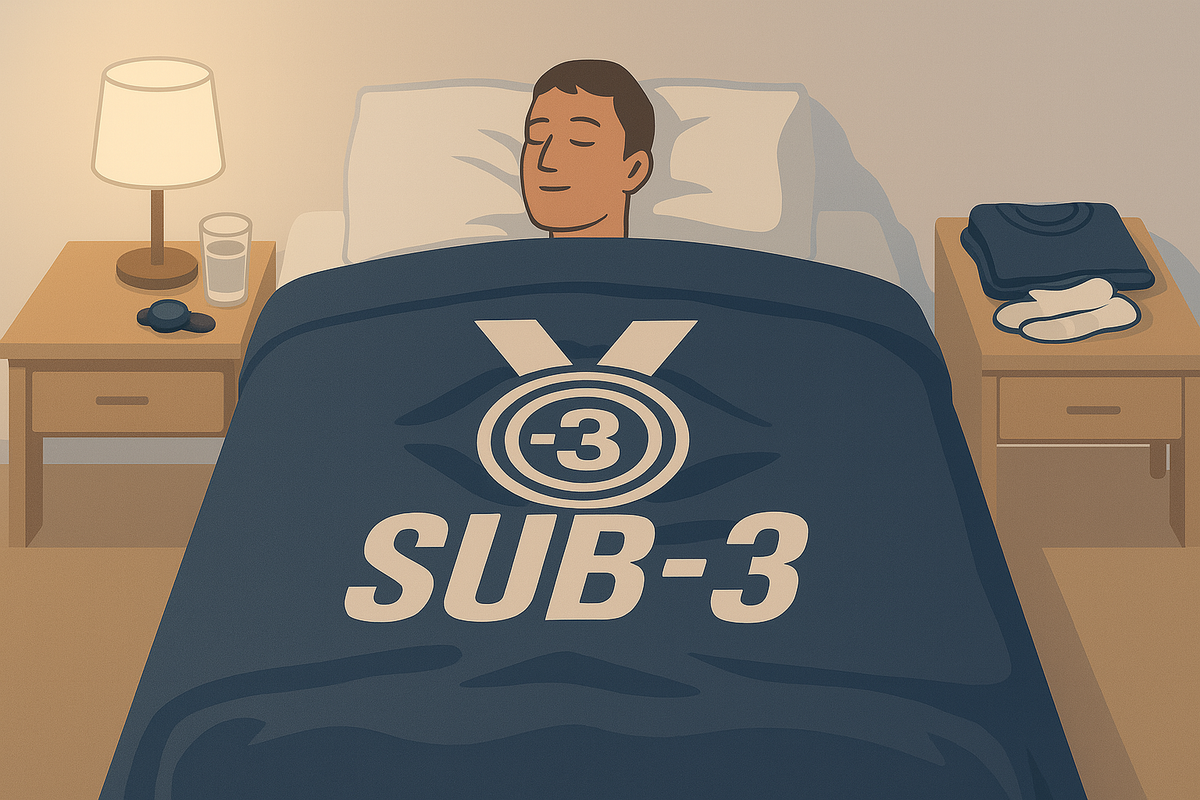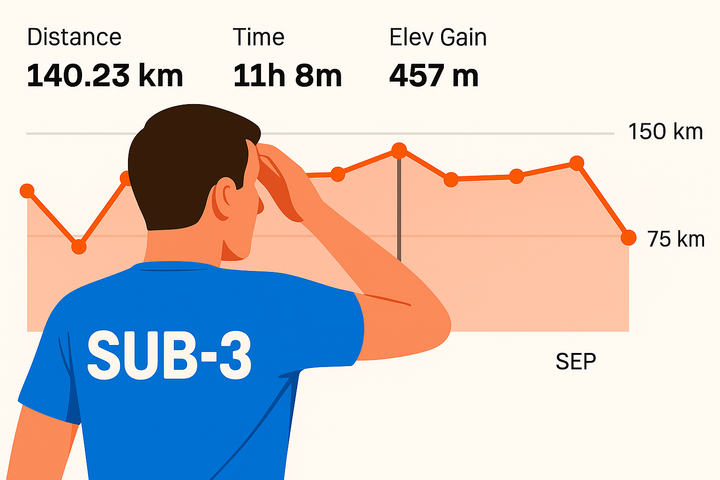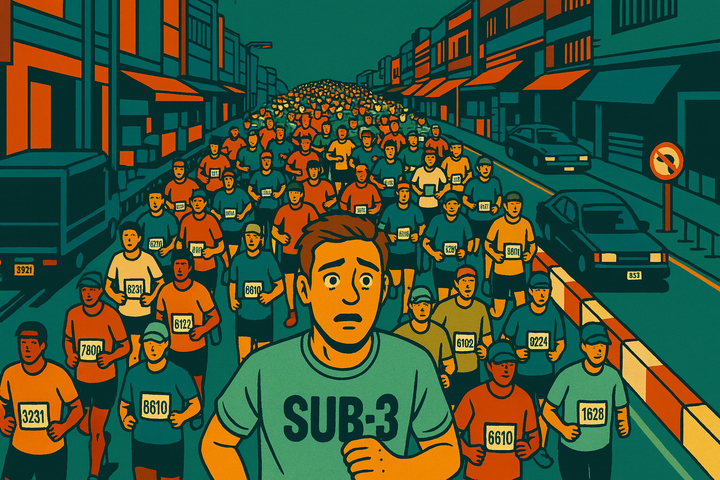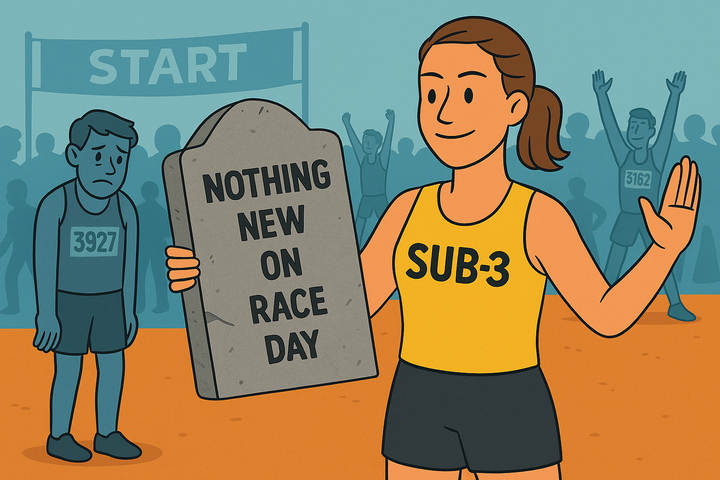Why sleep is an integral part of sub-3 training
Sleep isn’t slacking – it’s part of the plan. Prioritise rest like you prioritise mileage.

Like many runners chasing a sub-3, my Garmin now features a Sleep Coach. After a big session it often nudges me from a baseline of 7h50 to a suggested 8h20. After an ultramarathon, it once demanded a full nine hours – easier said than done when you’re buzzing on caffeine gels and post-race adrenaline.
When you’re trying to squeeze in 100km a week, sleep can feel like one more thing on the to-do list. But while we obsess over splits, elevation and fuelling, sleep is often the unsung hero. Skip it, and all that training might just leave you tired, sore and plateaued.
Here’s why it matters – and 10 practical ways to sleep like a champion (without having to live like a monk).
1. Know why sleep counts
During deep sleep, your body releases growth hormone and gets to work repairing muscle tissue, regulating hormones and consolidating memory. REM sleep may even help with visualisation and processing anxiety. Ever dreamt of turning up to a race without your kit? That’s your brain running through simulations - albeit the sweaty-palmed kind.
2. Cut the screens – pick up a book instead
Blue light from phones and TVs delays melatonin release, making it harder to nod off. It’s not just the light either – scrolling your way through Strava, the news or race previews isn’t exactly calming. Ditch the screen and do some light stretching, journaling or read a proper book. Even a boring one will do.
3. No caffeine after lunch
Caffeine has a half-life of around six hours – meaning a 3pm coffee is still doing laps in your bloodstream at bedtime. I cut off after midday unless it’s an evening race, in which case it’s a trade-off. Just don’t expect to wind down easily after a 10K and a double espresso.
4. Skip the after-work pint
Alcohol interferes with deep sleep and ramps up dehydration. It also tends to increase middle-of-the-night toilet trips. If you’re going to sacrifice a run, don’t let it be the one your body does while you’re asleep – the one that rebuilds muscle, resets your brain and boosts your immunity.
5. Try magnesium and protein before bed
A small dose of protein gives your body building blocks for overnight repair. Magnesium helps with muscle function and may aid relaxation. I often have a bowl of skyr with some chocolate protein powder stirred in, washed down with a magnesium tablet and an elderflower Trip. Not quite a dessert – but not far off.
6. Nap like a pro
A short nap (10 to 20 minutes) can improve alertness, mood and even performance. Studies back this up – and so do elite athletes. Sure, it’s not always easy with work or family commitments, but if you can find a quiet corner or a reclining chair, your legs will thank you. Just don’t call it lazy – call it elite recovery.
7. Stick to a routine
Your body likes rhythm – and irregular bedtimes mess with your circadian cycle. Going to sleep and waking up at roughly the same time each day (yes, even on weekends) trains your system to be more efficient. Consistency trumps chaos – even if your child, dog or Garmin has other ideas.
8. Sleep like Zatopek
In Today We Die a Little, Richard Askwith notes that Emil Zatopek – Olympic triple gold medallist and sub-3 marathon debutant – prioritised eight or nine hours of sleep a night, even during his most intense training blocks. If the man who revolutionised interval training also knew when to rest, we probably should too.
9. Prep for the next day
A tidy mind sleeps better. Laying out your kit, checking the weather, prepping breakfast – these simple habits reduce stress and make early starts less chaotic. The goal is to go to bed feeling calm, not wondering where your left sock is.
10. Don’t panic about one bad night
It’s normal to sleep badly the night before a big race. What matters more is the sleep you get in the two nights prior. And if your child wakes you at 2am or you toss and turn with pre-race nerves, don’t stress. You don’t have to be a saint or an ascetic monk – just consistent where it counts.
Bonus tip: track it – or don’t
Some runners love their sleep data – heart rate variability, REM cycles, stress scores. Others find it just makes them anxious. Personally, I take my watch off. But if your device helps you build better habits, go for it. Just don’t lose sleep over your sleep score.
Final word
Sleep isn’t a luxury – it’s a performance tool. The best runners don’t just train hard – they recover smart. So take your bedtime seriously, enjoy the wind-down rituals and don’t feel guilty for turning in early. You’re not lazy – you’re getting faster. In fact, it might be the only time lying down brings you closer to standing on a podium.
Enjoyed this article? Help keep Sub-3 running — support us with a coffee.
To help fund the running of the site, Sub-3 is an Amazon Associate and earns from qualifying purchases. We only recommend gear or kit that has genuinely helped in our own running and that we believe is worth considering.



